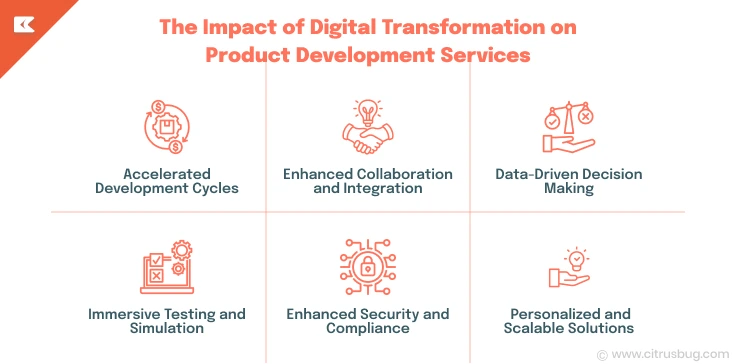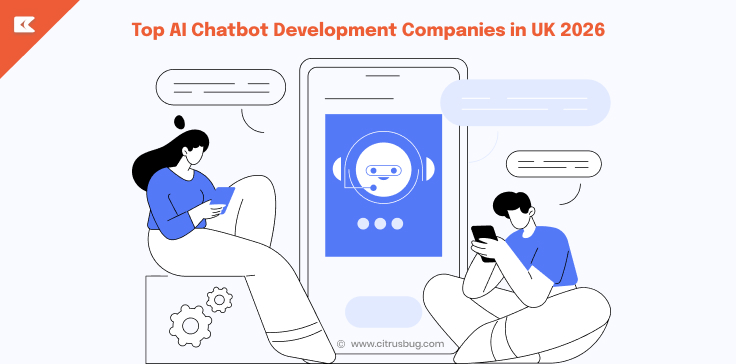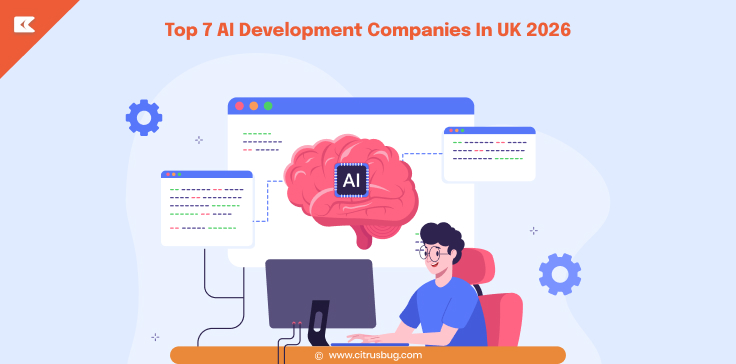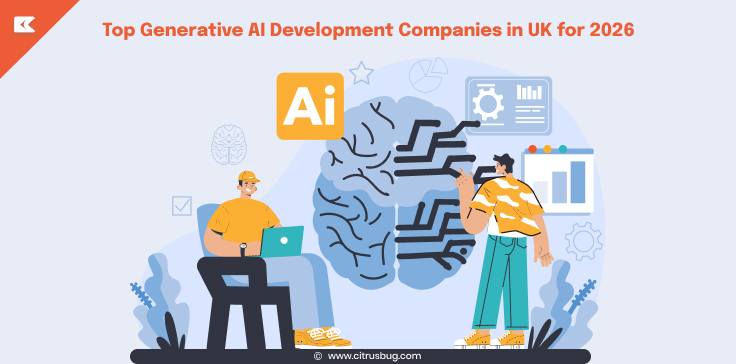Top Digital Transformation Trends That Shaping Businesses
- September 25, 2024
-
3583 Views
- by Ishan Vyas
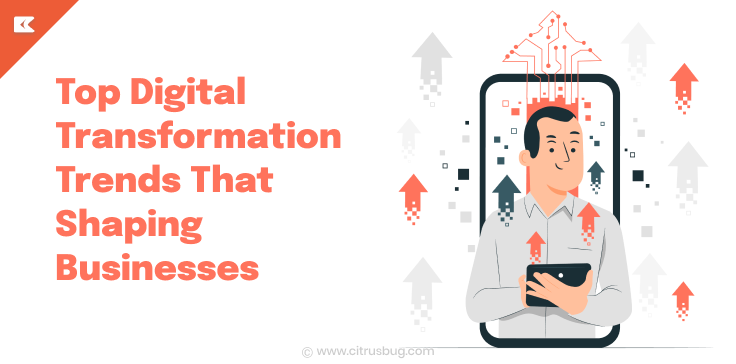
Digital transformation stands as a trendsetter in an age wherein technological progress sets the pace for business transformation. Towards the latter end of 2024, knowing and harnessing these developments is critical to those organizations that will continue to be relevant and innovative. Let’s explore what digital transformation entails, why it’s imperative, and the top patterns driving this advancement.
What is Digital Transformation?
Digital transformation refers to the significant changes in business tasks, cycles, and techniques driven by the integration of digital technologies. This shift includes all that from further developing client encounters and functional efficiencies to encouraging advancement and growing new plans of action. It’s not just about embracing new advancements but rather in a general sense reconsidering how organizations work and convey worth to their clients.
Why is Digital Transformation Essential?
Digital transformation is no longer a luxury but a necessity in today’s fast-paced world. It helps companies:
- Improve Effectiveness: Automating routine tasks and advancing work processes smooth out tasks, diminishing time and cost.
- Improve Customer Experience: Personalized Services and Relational Consistency with customers establishes consumer loyalty and happiness.
- Encourage Innovation: Having quick access to frontline technologies opens up new ways to drive innovation for competitive advantage.
- Adjust to Market Changes: Agility and adaptation to change in the market are a sure pathway to living or dying.
- Gain Data-Driven Insights: Business intelligence improves as a whole with data analytics that inform decisions.
Top Digital Transformation Trends for 2024:
AI for Cutting Down OPEX
Artificial Intelligence changes the way with which organizations perform their tasks. AI reduces OPEX and increases productivity in organization by automating its repetitive work. Some applications of AI include predictive maintenance, AI chatbot development, and automated data analytics. Companies such as Siemens and GE already apply Artificial Intelligence to smoothen the manufacturing process as well as predictive analytics.
Cybersecurity
The faster digital transformation grows in the world of business, the higher the level of risk to cyber threats, requiring only strong cybersecurity measures to protect sensitive information and trust with customers. As for 2024, business trends have reached cutting-edge security measures by implementing zero-trust architecture AI-based threat detection, and comprehensive data encryption. Some prominent organizations leading the way include CrowdStrike and Palo Alto Networks in providing some of the most advanced cybersecurity solutions.
Cloud Computing
One of the backbones of the digital transformation is cloud computing in which businesses enjoy unmatched cost-effectiveness, scalability, and flexibility as compared with traditional IT infrastructures. Hybrid and multi-cloud systems have enabled a faster innovation and even better operations of businesses than before. As part of this shift, certifications in cloud management, often supported by Microsoft AZ-104 Dumps, have become essential for IT professionals aiming to manage platforms like Microsoft Azure.
Low-Code or No-Code Platforms
Low-code and no-code platforms empower businesses to develop applications with minimal coding knowledge. This approach democratizes software development, facilitating the quicker deployment of customised solutions and encouraging cross-departmental creativity. Businesses are using tools like Microsoft’s Power Apps, OutSystems, and Mendix to swiftly and effectively develop customised apps.
AR and VR Integration
Virtual reality and augmented reality are changing the ways of training and the experiences of the client. While virtual reality offers the most realistic training and development simulations, augmented reality in retail provides virtual try-ons and interactive shopping experiences. Two companies applying AR and VR for employee training and product engagement are Boeing and IKEA.
5G Revolution
The rollout of 5G technology is set to change availability, offering quicker paces and lower latency. This headway works with continuous information handling, upholds the development of IoT (Internet of Things) gadgets, and improves versatile encounters. Enterprises like medical care, assembling, and coordinated factors are as of now investigating the capability of 5G to work on functional proficiency and empower new applications.
Everything-as-a-Service (XaaS)
XaaS envelops a scope of administrations conveyed over the web, including Software-as-a-Service (SaaS), Infrastructure-as-a-Service (IaaS), and Platform-as-a-Service (PaaS). This model gives adaptability and versatility, permitting organizations to get to a wide cluster of devices and administrations without significant upfront investments. Organizations like Salesforce, IBM, and Oracle are driving this trend, offering comprehensive solutions to meet assorted business needs.
Examples of Digital Transformation Across Industries
- Healthcare: This telemedicine platform and AI-driven diagnostics bring a whole new change to how patients are treated. For instance, Teladoc can afford to have its platform of remote consultations. IBM Watson Health uses AI to assess millions of pages of clinical literature and aid in clinical decision support.
- Retail: E-commerce leaders like Amazon use AI to recommend products and automate logistics. At the other end, Walmart relies on data analytics and robotics in coming up with an optimal management of its inventory and stocking its stores.
- Manufacturing: Industry 4.0 technologies like IoT sensors and AI-driven automation have proven effective in increasing manufacturing efficiency, while companies such as Bosch and Honeywell will combine these technologies and integrate them towards increased productivity and less downtime.
The Impact of Digital Transformation on Product Development Services
Indeed, as digital transformation is profoundly and far-reaching concerning the impact on product development services, it extends far beyond the mere transformation of how products are designed and, in reality, reshapes how products are conceptualized, tested, and finally marketed to consumers.
1. Accelerated Development Cycles
One of the most significant impacts of digital transformation on product development is the acceleration of development cycles. Low code as well as no-code platforms combined with agile methodologies also facilitate iteration and prototyping faster and give companies more agility in responding to change and to customer feedback to shorten time-to-market and boost the chance of innovating. These tools can now be relied upon by digital product development services to streamline workflows, cut development time, and bring innovative solutions more rapidly to market.
2. Enhanced Collaboration and Integration
Cloud computing and other collaborative tools really change the way teams work. Basically, the nature of cloud-based services enables development teams to work in real-time, notwithstanding their location. Whenever such tools are integrated, they lead to even better communication, reduced delays, and allow direct access among people regarding the project updates and resources on schedule, while also enhancing lead generation efforts by streamlining contact and collaboration.
3. Data-Driven Decision Making
The ability of AI and advanced analytics to empower the product developer in offering more meaningful insights into data has also helped. With AI and machine learning consulting services and process intelligence software, companies would be able to analyze gigabytes of customer data, predict market trends, and optimize product features more effectively. This data-centric approach not only helps improve in terms of quality and relevance but also enhances decision-making at strategic levels.
4. Immersive Testing and Simulation
Augmented Reality and Virtual Reality, which both are changing the product testing and simulation, will enable developers to design a wide range of immersive prototypes and simulate performances virtually before real events. This way, testing will be more accurate and costs associated with real physical products lower. The AR and VR technologies allow the development service to smoothen out product designs, test user interactions, and identify areas where potential issues might arise before their launch in the market.
5. Enhanced Security and Compliance
With digital products becoming more complex with each passing day, there has never been a better time to ensure strong cybersecurity and compliance. For industries such as defense and law enforcement, integrating tactical gear with secure IoT systems exemplifies how digital transformation bridges physical and digital security needs. In fact, strengthening security measures and bringing compliance protocols to every phase of product development falls among the trends which digital transformation proposes. It ensures proper handling of sensitive information, protecting intellectual property, as well as ensuring that products abide by regulatory requirements.
As organizations embrace digital transformation, many are turning to MVP development as a strategic approach to bring products to market faster. This allows companies to create a functional product with core features, test its viability, and iterate based on feedback.
6. Personalized and Scalable Solutions
The model of XaaS will spur the designing of highly personal as well as scalable digital products. Product offerings as services can provide a tailored solution for individual customers, making it possible to adapt to changing requirements yet still provide flexible pricing and update capabilities. The adoption of XaaS frameworks is becoming increasingly popular for services that can focus on customized and scalable approaches in the development of digital products in order to deliver customer satisfaction and increase business agility.
Conclusion
Business is undergoing a radical change through digital transformation, driven both by cutting-edge technologies and by changing market demands. Things are changing dramatically because of the trends involving AI, cybersecurity, cloud computing, and AR/VR integrations. In terms of how companies operate and their relation with customers, the changes are just going to be dramatic. This is not about keeping up with the change to be competitive; it’s really about harvesting and unleashing the power of innovation for growth and delivering value. Companies that correctly execute digital transformation trends will be prime candidates to flourish in the super dynamic and constantly shifting marketplace as we navigate through 2024 and beyond.
The digital revolution is transforming the way product development services are done by applying efficiency, collaboration, and innovation. Those days when one has to choose either quality of work or speed are gone, since businesses can do that very well. Digital transformation has been ushered in to change how any commercial business operates by being transformed into product development services that focus more on efficiency, collaboration, and innovation. Actually, embracing these trends does not only bring an improvement in developmental processes but also creates products that better meet the needs and demands of customers in the markets. Digital product development services utilize transformative technologies such as AI, cloud computing, AR/VR, among others, to bring about new eras of innovation and growth. Going forward, these advancements will even find the most promising individuals who will take the lead in this competitive digital landscape.





 SaaS Development
SaaS Development Web Application Development
Web Application Development Mobile Application Development
Mobile Application Development Custom Software Development
Custom Software Development Cloud Development
Cloud Development DevOps Development
DevOps Development MVP Development
MVP Development Digital Product Development
Digital Product Development Hire Chatbot Developers
Hire Chatbot Developers Hire Python Developers
Hire Python Developers Hire Django Developers
Hire Django Developers Hire ReactJS Developers
Hire ReactJS Developers Hire AngularJS Developers
Hire AngularJS Developers Hire VueJS Developers
Hire VueJS Developers Hire Full Stack Developers
Hire Full Stack Developers Hire Back End Developers
Hire Back End Developers Hire Front End Developers
Hire Front End Developers AI Healthcare Software Development & Consulting
AI Healthcare Software Development & Consulting Healthcare App Development
Healthcare App Development EHR Software Development
EHR Software Development Healthcare AI Chatbot Development
Healthcare AI Chatbot Development Telemedicine App Development Company
Telemedicine App Development Company Medical Billing Software Development
Medical Billing Software Development Fitness App Development
Fitness App Development RPM Software Development
RPM Software Development Medicine Delivery App Development
Medicine Delivery App Development Medical Device Software Development
Medical Device Software Development Patient Engagement Software Solutions
Patient Engagement Software Solutions Mental Health App Development
Mental Health App Development Healthcare IT Consulting
Healthcare IT Consulting Healthcare CRM Software Development
Healthcare CRM Software Development Healthcare IT Managed Services
Healthcare IT Managed Services Healthcare Software Testing services
Healthcare Software Testing services Medical Practice Management Software
Medical Practice Management Software Outsourcing Healthcare IT Services
Outsourcing Healthcare IT Services IoT Solutions for Healthcare
IoT Solutions for Healthcare Medical Image Analysis Software Development Services
Medical Image Analysis Software Development Services Lending Software Development Services
Lending Software Development Services Payment Gateway Software Development
Payment Gateway Software Development Accounting Software Development
Accounting Software Development AI-Driven Banking App Development
AI-Driven Banking App Development Insurance Software Development
Insurance Software Development Finance Software Development
Finance Software Development Loan Management Software Development
Loan Management Software Development Decentralized Finance Development Services
Decentralized Finance Development Services eWallet App Development
eWallet App Development Payment App Development
Payment App Development Money Transfer App Development
Money Transfer App Development Mortgage Software Development
Mortgage Software Development Insurance Fraud Detection Software Development
Insurance Fraud Detection Software Development Wealth Management Software Development
Wealth Management Software Development Cryptocurrency Exchange Platform Development
Cryptocurrency Exchange Platform Development Neobank App Development
Neobank App Development Stock Trading App Development
Stock Trading App Development AML software Development
AML software Development Web3 Wallet Development
Web3 Wallet Development Robo-Advisor App Development
Robo-Advisor App Development Supply Chain Management Software Development
Supply Chain Management Software Development Fleet Management Software Development
Fleet Management Software Development Warehouse Management Software Development
Warehouse Management Software Development LMS Development
LMS Development Education App Development
Education App Development Inventory Management Software Development
Inventory Management Software Development Property Management Software Development
Property Management Software Development Real Estate CRM Software Development
Real Estate CRM Software Development Real Estate Document Management Software
Real Estate Document Management Software Construction App Development
Construction App Development Construction ERP Software Development
Construction ERP Software Development





